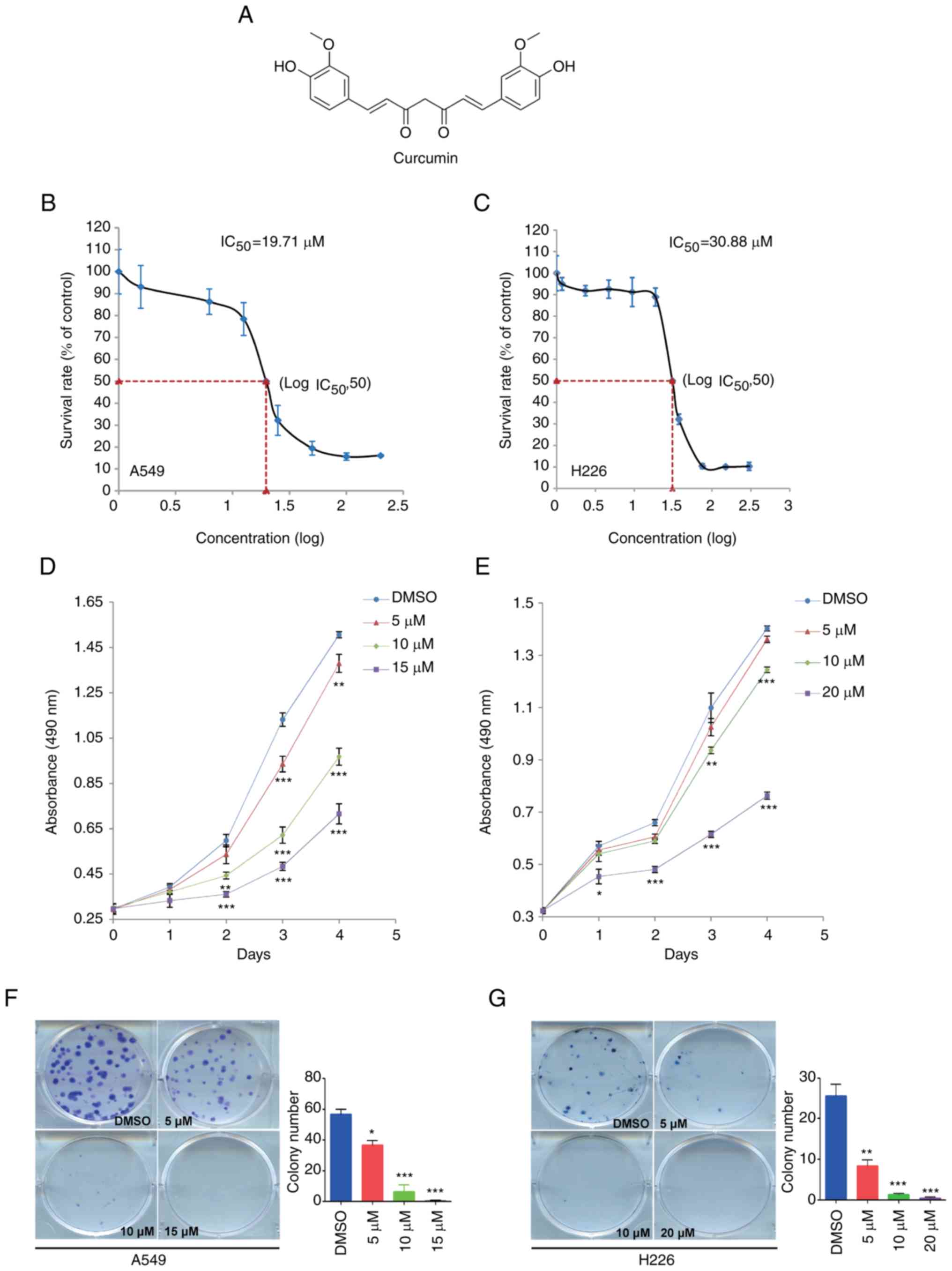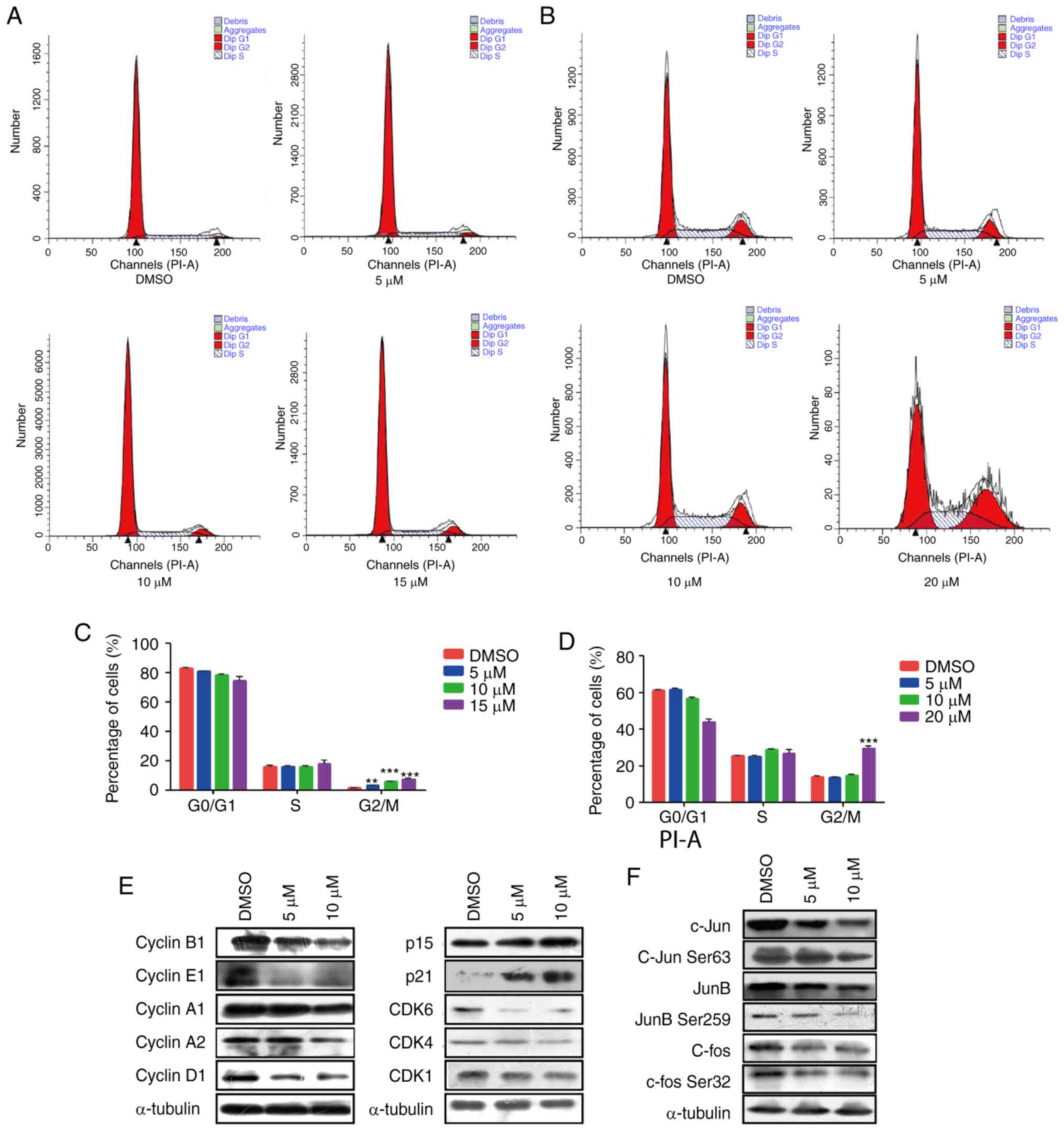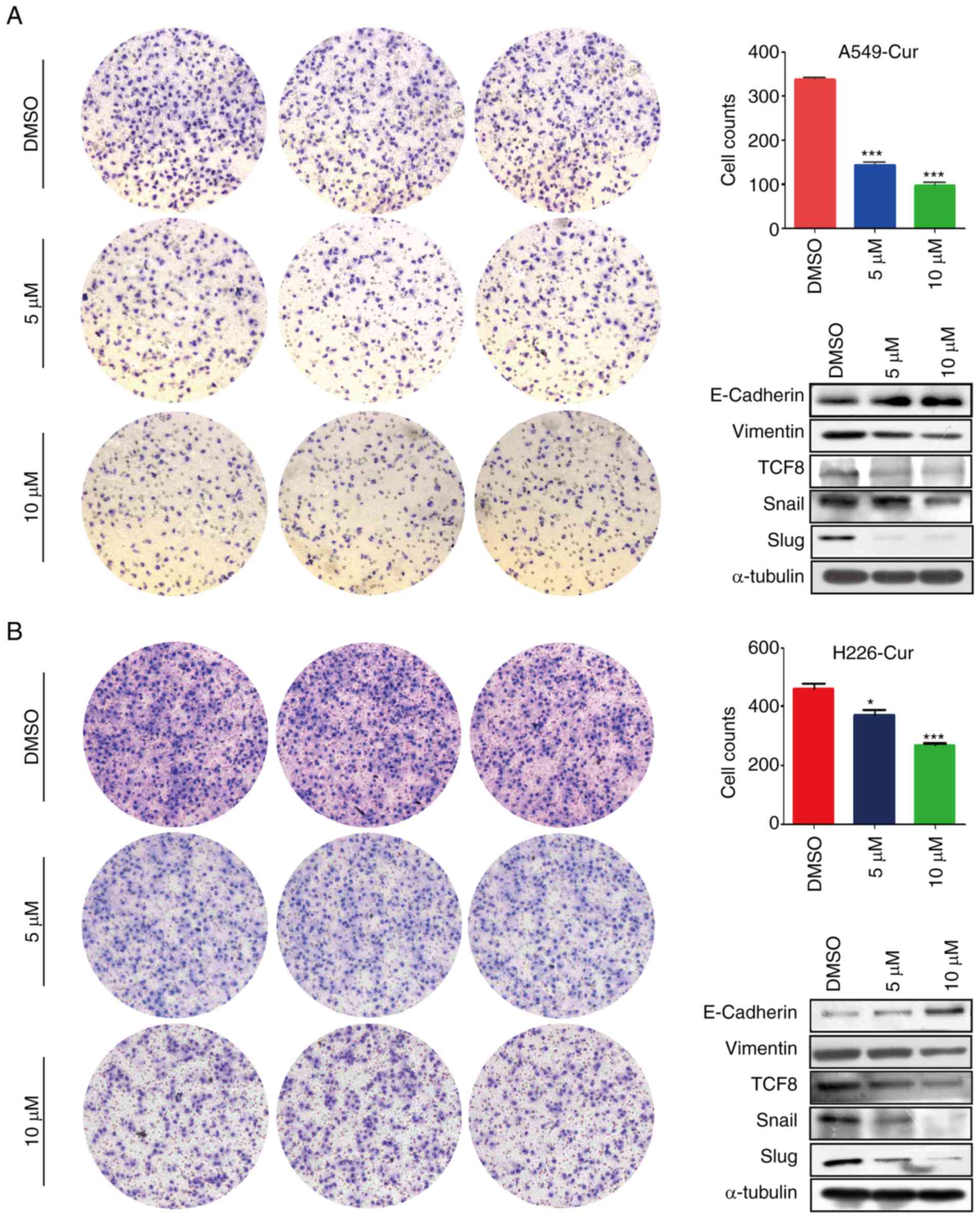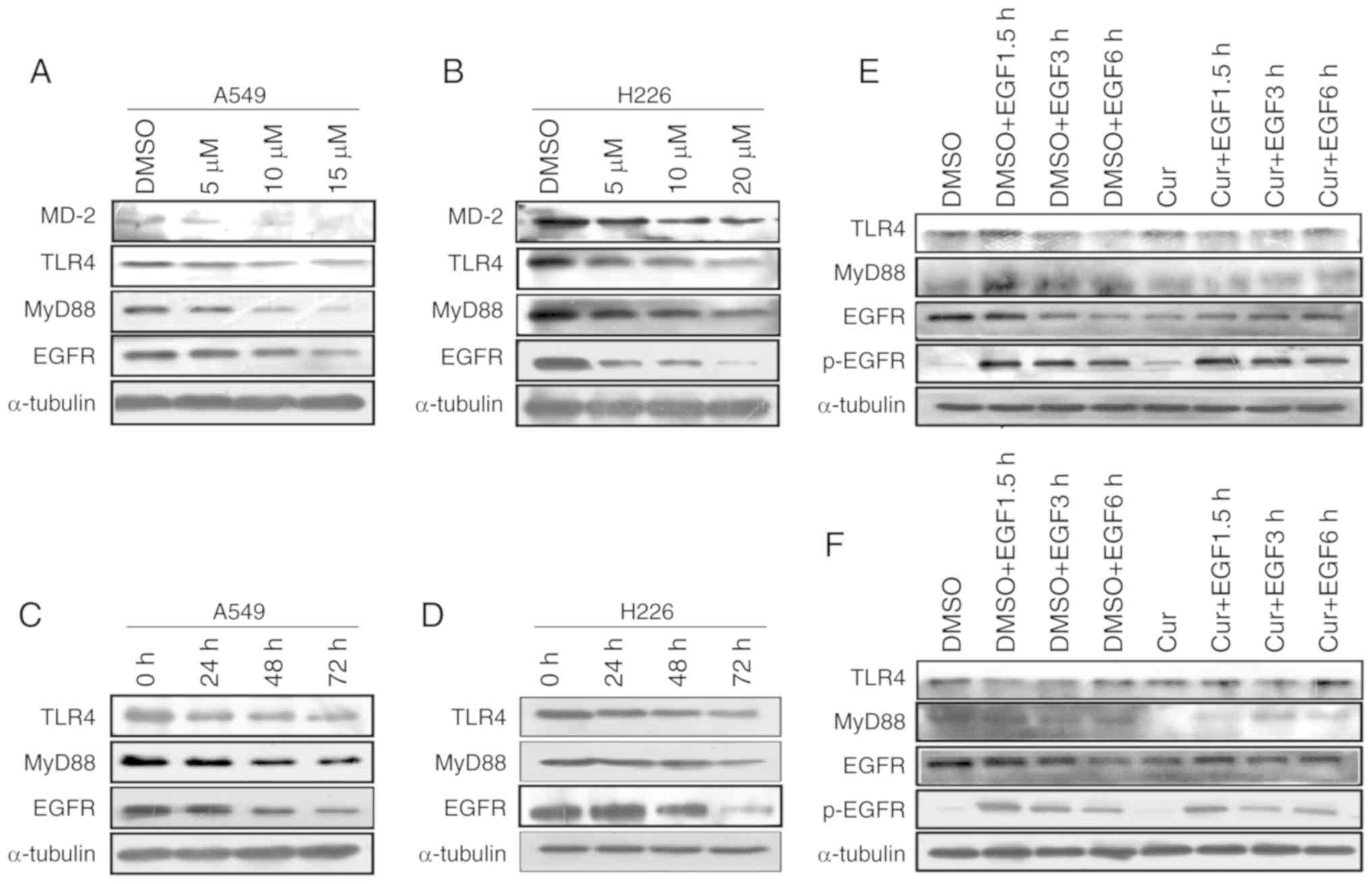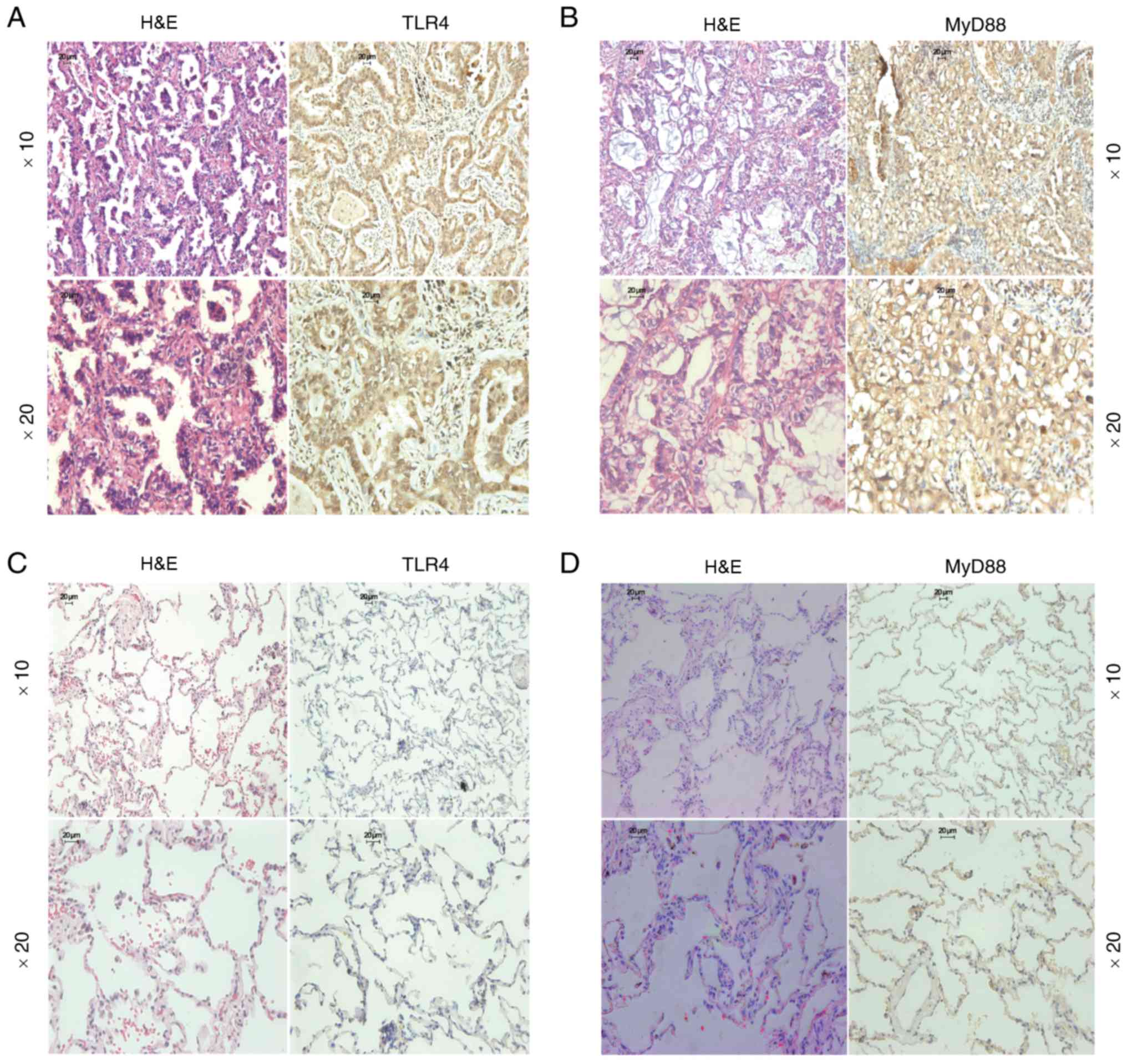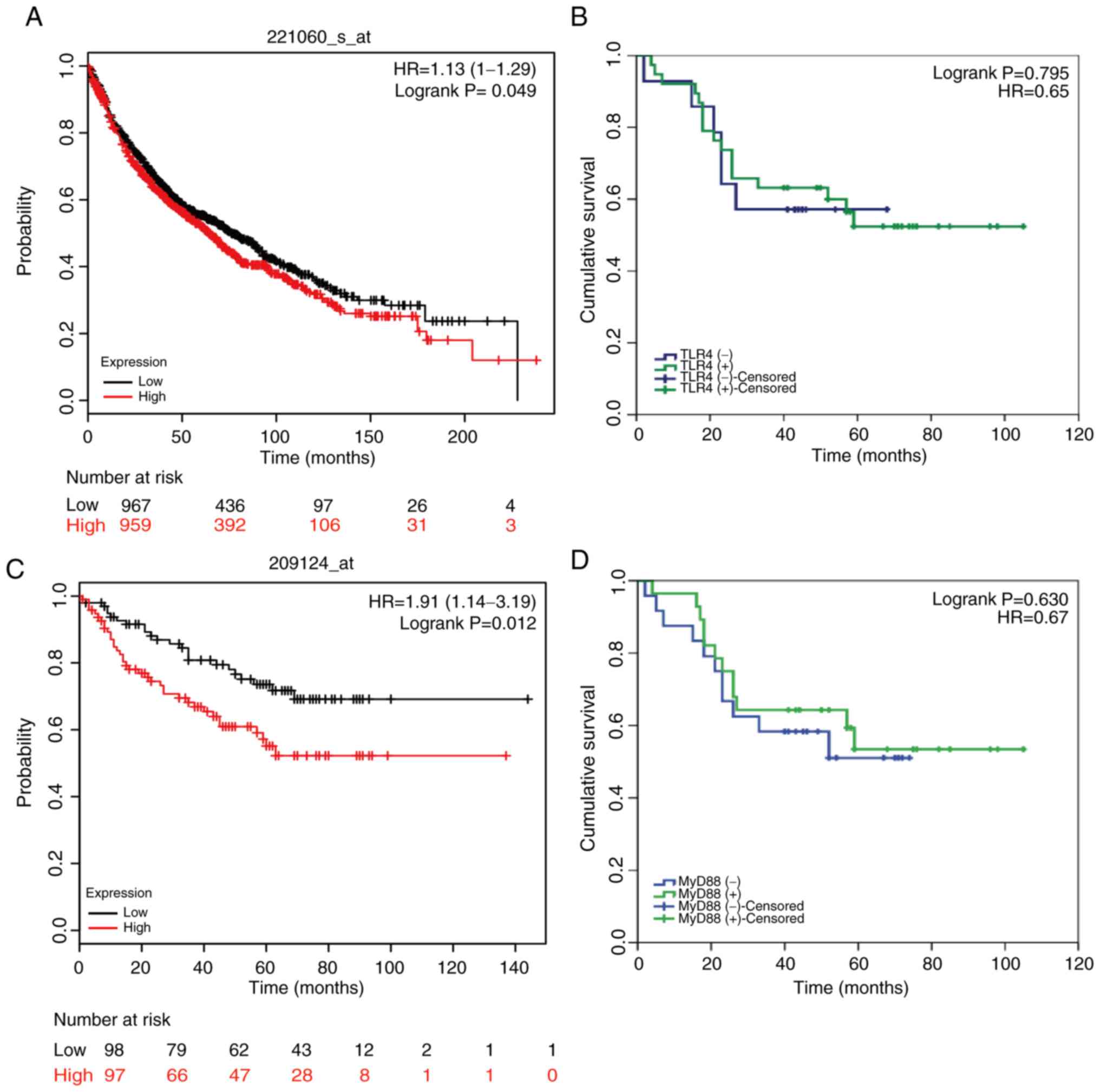|
1
|
Chen W, Zheng R, Baade PD, Zhang S, Zeng
H, Bray F, Jemal A, Yu XQ and He J: Cancer statistics in China,
2015. CA Cancer J Clin. 66:115–132. 2016. View Article : Google Scholar : PubMed/NCBI
|
|
2
|
Siegel RL, Miller KD and Jemal A: Cancer
statistics, 2017. CA Cancer J Clin. 67:7–30. 2017. View Article : Google Scholar : PubMed/NCBI
|
|
3
|
Torre LA, Bray F, Siegel RL, Ferlay J,
Lortet-Tieulent J and Jemal A: Global cancer statistics, 2012. CA
Cancer J Clin. 65:87–108. 2015. View Article : Google Scholar : PubMed/NCBI
|
|
4
|
Torre LA, Siegel RL and Jemal A: Lung
cancer statistics. Adv Exp Med Biol. 893:1–19. 2016. View Article : Google Scholar : PubMed/NCBI
|
|
5
|
Kiuchi F, Goto Y, Sugimoto N, Akao N,
Kondo K and Tsuda Y: Nematocidal activity of turmeric: Synergistic
action of curcuminoids. Chem Pharm Bull (Tokyo). 41:1640–1643.
1993. View Article : Google Scholar : PubMed/NCBI
|
|
6
|
Shishodia S, Sethi G and Aggarwal BB:
Curcumin: Getting back to the roots. Ann NY Acad Sci. 1056:206–217.
2005. View Article : Google Scholar : PubMed/NCBI
|
|
7
|
Shishodia S: Molecular mechanisms of
curcumin action: Gene expression. Biofactors. 39:37–55. 2013.
View Article : Google Scholar : PubMed/NCBI
|
|
8
|
Aggarwal BB and Sung B: Pharmacological
basis for the role of curcumin in chronic diseases: An age-old
spice with modern targets. Trends Pharmacol Sci. 30:85–94. 2009.
View Article : Google Scholar : PubMed/NCBI
|
|
9
|
Aggarwal BB and Harikumar KB: Potential
therapeutic effects of curcumin, the anti-inflammatory agent,
against neurodegenerative, cardiovascular, pulmonary, metabolic,
autoimmune and neoplastic diseases. Int J Biochem Cell Biol.
41:40–59. 2009. View Article : Google Scholar : PubMed/NCBI
|
|
10
|
Kuttan R, Bhanumathy P, Nirmala K and
George MC: Potential anticancer activity of turmeric (Curcuma
longa). Cancer Lett. 29:197–202. 1985. View Article : Google Scholar : PubMed/NCBI
|
|
11
|
Kuttan R, Sudheeran PC and Josph CD:
Turmeric and curcumin as topical agents in cancer therapy. Tumori.
73:29–31. 1987. View Article : Google Scholar : PubMed/NCBI
|
|
12
|
Mishra A, Liu S, Sams GH, Curphey DP,
Santhanam R, Rush LJ, Schaefer D, Falkenberg LG, Sullivan L,
Jaroncyk L, et al: Aberrant overexpression of IL-15 initiates large
granular lymphocyte leukemia through chromosomal instability and
DNA hypermethylation. Cancer Cell. 22:645–655. 2012. View Article : Google Scholar : PubMed/NCBI
|
|
13
|
Demaria S, Pikarsky E, Karin M, Coussens
LM, Chen YC, El-Omar EM, Trinchieri G, Dubinett SM, Mao JT, Szabo
E, et al: Cancer and inflammation: Promise for biologic therapy. J
Immunother. 33:335–351. 2010. View Article : Google Scholar : PubMed/NCBI
|
|
14
|
Katoh H, Wang D, Daikoku T, Sun H, Dey SK
and Dubois RN: CXCR2-expressing myeloid-derived suppressor cells
are essential to promote colitis-associated tumorigenesis. Cancer
Cell. 24:631–644. 2013. View Article : Google Scholar : PubMed/NCBI
|
|
15
|
Wang L, Zhang H, Rodriguez S, Cao L,
Parish J, Mumaw C, Zollman A, Kamoka MM, Mu J, Chen DZ, et al:
Notch-dependent repression of miR-155 in the bone marrow niche
regulates hematopoiesis in an NF-κB-dependent manner. Cell Stem
Cell. 15:51–65. 2014. View Article : Google Scholar : PubMed/NCBI
|
|
16
|
Garza-Gonzalez E, Bosques-Padilla FJ,
Mendoza-Ibarra SI, Flores-Gutierrez JP, Maldonado-Garza HJ and
Perez-Perez GI: Assessment of the toll-like receptor 4 Asp299Gly,
Thr399Ile and interleukin-8-251 polymorphisms in the risk for the
development of distal gastric cancer. BMC Cancer. 7:702007.
View Article : Google Scholar : PubMed/NCBI
|
|
17
|
He W, Liu Q, Wang L, Chen W, Li N and Cao
X: TLR4 signaling promotes immune escape of human lung cancer cells
by inducing immunosuppressive cytokines and apoptosis resistance.
Mol Immunol. 44:2850–2859. 2007. View Article : Google Scholar : PubMed/NCBI
|
|
18
|
Cheng I, Plummer SJ, Casey G and Witte JS:
Toll-like receptor 4 genetic variation and advanced prostate cancer
risk. Cancer Epidemiol Biomarkers Prev. 16:352–355. 2007.
View Article : Google Scholar : PubMed/NCBI
|
|
19
|
Chicoine MR, Zahner M, Won EK, Kalra RR,
Kitamura T, Perry A and Higashikubo R: The in vivo antitumoral
effects of lipopolysaccharide against glioblastoma multiforme are
mediated in part by Toll-like receptor 4. Neurosurgery. 60:372–381.
2007. View Article : Google Scholar : PubMed/NCBI
|
|
20
|
Semlali A, Reddy Parine N, Arafah M,
Mansour L, Azzi A, Al Shahrani O, Al Amri A, Shaik JP, Aljebreen
AM, Alharbi O, et al: Expression and polymorphism of toll-like
receptor 4 and effect on NF-κB mediated inflammation in colon
cancer patients. PLoS One. 11:e01463332016. View Article : Google Scholar : PubMed/NCBI
|
|
21
|
Köe M: GPCRs and EGFR-Cross-talk of
membrane receptors in cancer. Bioorg Med Chem Lett. 27:3611–3620.
2017. View Article : Google Scholar : PubMed/NCBI
|
|
22
|
Lev-Ari S, Starr A, Vexler A, Karaush V,
Loew V, Greif J, Fenig E, Aderka D and Ben-Yosef R: Inhibition of
pancreatic and lung adenocarcinoma cell survival by curcumin is
associated with increased apoptosis, down-regulation of COX-2 and
EGFR and inhibition of Erk1/2 activity. Anticancer Res.
26:4423–4430. 2006.PubMed/NCBI
|
|
23
|
De S, Zhou H, DeSantis D, Croniger CM, Li
X and Stark GR: Erlotinib protects against LPS-induced endotoxicity
because TLR4 needs EGFR to signal. Proc Natl Acad Sci USA.
112:9680–9685. 2015. View Article : Google Scholar : PubMed/NCBI
|
|
24
|
Basu S, Pathak SK, Chatterjee G, Pathak S,
Basu J and Kundu M: Helicobacter pylori protein HP0175
transactivates epidermal growth factor receptor through TLR4 in
gastric epithelial cells. J Biol Chem. 283:32369–32376. 2008.
View Article : Google Scholar : PubMed/NCBI
|
|
25
|
Hsu D, Fukata M, Hernandez YG, Sotolongo
JP, Goo T, Maki J, Hayes LA, Ungaro RC, Chen A, Breglio KJ, et al:
Toll-like receptor 4 differentially regulates epidermal growth
factor-related growth factors in response to intestinal mucosal
injury. Lab Invest. 90:1295–1305. 2010. View Article : Google Scholar : PubMed/NCBI
|
|
26
|
Edge SB and Compton CC: The American Joint
Committee on Cancer: The 7th edition of the AJCC cancer staging
manual and the future of TNM. Ann Surg Oncol. 17:1471–1474. 2010.
View Article : Google Scholar : PubMed/NCBI
|
|
27
|
Guo H, Luo H, Yuan H, Xia Y, Shu P, Huang
X, Lu Y, Liu X, Keller ET, Sun D, et al: Litchi seed extracts
diminish prostate cancer progression via induction of apoptosis and
attenuation of EMT through Akt/GSK-3β signaling. Sci Rep.
7:416562017. View Article : Google Scholar : PubMed/NCBI
|
|
28
|
Barnum KJ and O'Connell MJ: Cell cycle
regulation by checkpoints. Methods Mol Biol. 1170:29–40. 2014.
View Article : Google Scholar : PubMed/NCBI
|
|
29
|
Karin M, Liu ZG and Zandi E: AP-1 function
and regulation. Curr Opin Cell Biol. 9:240–246. 1997. View Article : Google Scholar : PubMed/NCBI
|
|
30
|
Schwabe RF, Bradham CA, Uehara T, Hatano
E, Bennett BL, Schoonhoven R and Brenner DA: c-Jun-N-terminal
kinase drives cyclin D1 expression and proliferation during liver
regeneration. Hepatology. 37:824–832. 2003. View Article : Google Scholar : PubMed/NCBI
|
|
31
|
Toualbi-Abed K, Daniel F, Güller MC,
Legrand A, Mauriz JL, Mauviel A and Bernuau D: Jun D cooperates
with p65 to activate the proximal kappaB site of the cyclin D1
promoter: Role of PI3K/PDK-1. Carcinogenesis. 29:536–543. 2008.
View Article : Google Scholar : PubMed/NCBI
|
|
32
|
Lv X, Wang H, Su A, Xu S and Chu Y: Herpes
simplex virus type 2 infection triggers AP-1 transcription activity
through TLR4 signaling in genital epithelial cells. Virol J.
15:1732018. View Article : Google Scholar : PubMed/NCBI
|
|
33
|
Gradisar H, Keber MM, Pristovsek P and
Jerala R: MD-2 as the target of curcumin in the inhibition of
response to LPS. J Leukoc Biol. 82:968–974. 2007. View Article : Google Scholar : PubMed/NCBI
|
|
34
|
Chattopadhyay S, Veleeparambil M, Poddar
D, Abdulkhalek S, Bandyopadhyay SK, Fensterl V and Sen GC: EGFR
kinase activity is required for TLR4 signaling and the septic shock
response. EMBO Rep. 16:1535–1547. 2015. View Article : Google Scholar : PubMed/NCBI
|
|
35
|
Shehzad A, Lee J and Lee YS: Curcumin in
various cancers. Biofactors. 39:56–68. 2013. View Article : Google Scholar : PubMed/NCBI
|
|
36
|
Haricharan S and Brown P: TLR4 has a
TP53-dependent dual role in regulating breast cancer cell growth.
Proc Natl Acad Sci USA. 112:E3216–E3225. 2015. View Article : Google Scholar : PubMed/NCBI
|
|
37
|
Li J, Yin J, Shen W, Gao R, Liu Y, Chen Y,
Li X, Liu C, Xiang R and Luo N: TLR4 promotes breast cancer
metastasis via Akt/GSK3β/β-catenin pathway upon LPS stimulation.
Anat Rec (Hoboken). 300:1219–1229. 2017. View Article : Google Scholar : PubMed/NCBI
|
|
38
|
Sussman DA, Santaolalla R, Bejarano PA,
Garcia-Buitrago MT, Perez MT, Abreu MT and Clarke J: In silico and
ex vivo approaches identify a role for toll-like receptor 4 in
colorectal cancer. J Exp Clin Cancer Res. 33:452014. View Article : Google Scholar : PubMed/NCBI
|
|
39
|
Kim TW, Lee SJ, Oh BM, Lee H, Uhm TG, Min
JK, Park YJ, Yoon SR, Kim BY, Kim JW, et al: Epigenetic
modification of TLR4 promotes activation of NF-κB by regulating
methyl-CpG-binding domain protein 2 and Sp1 in gastric cancer.
Oncotarget. 7:4195–4209. 2016.PubMed/NCBI
|
|
40
|
Sun Z, Luo Q, Ye D, Chen W and Chen F:
Role of toll-like receptor 4 on the immune escape of human oral
squamous cell carcinoma and resistance of cisplatin-induced
apoptosis. Mol Cancer. 11:332012. View Article : Google Scholar : PubMed/NCBI
|
|
41
|
Wang EL, Qian ZR, Nakasono M, Tanahashi T,
Yoshimoto K, Bando Y, Kudo E, Shimada M and Sano T: High expression
of Toll-like receptor 4/myeloid differentiation factor 88 signals
correlates with poor prognosis in colorectal cancer. Br J Cancer.
102:908–915. 2010. View Article : Google Scholar : PubMed/NCBI
|
|
42
|
Wu K, Zhang H, Fu Y, Zhu Y, Kong L, Chen
L, Zhao F, Yu L and Chen X: TLR4/MyD88 signaling determines the
metastatic potential of breast cancer cells. Mol Med Rep.
18:3411–3420. 2018.PubMed/NCBI
|
|
43
|
Miyamoto Y, Suyama K and Baba H: Recent
advances in targeting the EGFR signaling pathway for the treatment
of metastatic colorectal cancer. Int J Mol Sci. 18(pii): E7522017.
View Article : Google Scholar : PubMed/NCBI
|
|
44
|
Radisky DC: Epithelial-mesenchymal
transition. J Cell Sci. 118:4325–4326. 2005. View Article : Google Scholar : PubMed/NCBI
|
|
45
|
He Z, Deng R, Huang X, Ni Y, Yang X, Wang
Z and Hu Q: Lipopolysaccharide enhances OSCC migration by promoting
epithelial-mesenchymal transition. J Oral Pathol Med. 44:685–692.
2015. View Article : Google Scholar : PubMed/NCBI
|
|
46
|
Ye K, Chen QW, Sun YF, Lin JA and Xu JH:
Loss of BMI-1 dampens migration and EMT of colorectal cancer in
inflammatory microenvironment through TLR4/MD-2/MyD88-mediated
NF-κB signaling. J Cell Biochem. 119:1922–1930. 2018. View Article : Google Scholar : PubMed/NCBI
|
|
47
|
Zhang X, Dai F, Chen J, Xie X, Xu H, Bai
C, Qiao W and Shen W: Antitumor effect of curcumin liposome after
transcatheter arterial embolization in VX2 rabbits. Cancer Biol
Ther. 20:642–652. 2019. View Article : Google Scholar : PubMed/NCBI
|
|
48
|
Li X, Ma S, Yang P, Sun B, Zhang Y, Sun Y,
Hao M, Mou R and Jia Y: Anticancer effects of curcumin on nude mice
bearing lung cancer A549 cell subsets SP and NSP cells. Oncol Lett.
16:6756–6762. 2018.PubMed/NCBI
|
|
49
|
Wang Z, Chen G, Chen L, Liu X, Fu W, Zhang
Y, Li C, Liang G and Cai Y: Insights into the binding mode of
curcumin to MD-2: Studies from molecular docking, molecular
dynamics simulations and experimental assessments. Mol Biosyst.
11:1933–1938. 2015. View Article : Google Scholar : PubMed/NCBI
|
|
50
|
Wang Y, Shan X, Dai Y, Jiang L, Chen G,
Zhang Y, Wang Z, Dong L, Wu J, Guo G and Liang G: Curcumin analog
L48H37 prevents lipopolysaccharide-induced TLR4 signaling pathway
activation and sepsis via targeting MD2. J Pharmacol Exp Ther.
353:539–550. 2015. View Article : Google Scholar : PubMed/NCBI
|
|
51
|
Liu Y, Lu C, Shen Q, Munoz-Medellin D, Kim
H and Brown PH: AP-1 blockade in breast cancer cells causes cell
cycle arrest by suppressing G1 cyclin expression and reducing
cyclin-dependent kinase activity. Oncogene. 23:8238–8246. 2004.
View Article : Google Scholar : PubMed/NCBI
|
|
52
|
Gong WJ, Liu JY, Yin JY, Cui JJ, Xiao D,
Zhuo W, Luo C, Liu RJ, Li X, Zhang W, et al: Resistin facilitates
metastasis of lung adenocarcinoma through the
TLR4/Src/EGFR/PI3K/NF-κB pathway. Cancer Sci. 109:2391–2400. 2018.
View Article : Google Scholar : PubMed/NCBI
|
|
53
|
Thuringer D, Hammann A, Benikhlef N,
Fourmaux E, Bouchot A, Wettstein G, Solary E and Garrido C:
Transactivation of the epidermal growth factor receptor by heat
shock protein 90 via Toll-like receptor 4 contributes to the
migration of glioblastoma cells. J Biol Chem. 286:3418–3428. 2011.
View Article : Google Scholar : PubMed/NCBI
|















